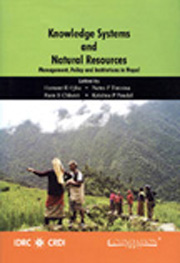Book contents
- Frontmatter
- Contents
- Preface
- Abbreviations
- Glossary of Nepali Words
- 1 Knowledge Systems and Deliberative Interface in Natural Resource Governance: An Overiew
- 2 Agricultural Technology Development in Nepal: Critical Assessment from Knowledge System Perspective
- 3 Contested Knowledge and Reconciliation in Nepal's Community Forestry: A Case of Forest Inventory Policy
- 4 From Grassroots to Policy Deliberation: The Case of Community Forest Users' Federation in Nepal
- 5 From Isolation to Interaction: Increasing Knowledge Interface in Chhattis Mauja Irrigation system in Nepal
- 6 Action Research Experience on Democratising Knowledge in Community Forestry in Nepal
- 7 Culturally Embedded Knowledge in Irrigation: People's Ways of Thriving in a Himalayan Village
- 8 Deliberative Knowledge Interface: Lessons and Policy Implications
- About the Contributors
8 - Deliberative Knowledge Interface: Lessons and Policy Implications
Published online by Cambridge University Press: 26 October 2011
- Frontmatter
- Contents
- Preface
- Abbreviations
- Glossary of Nepali Words
- 1 Knowledge Systems and Deliberative Interface in Natural Resource Governance: An Overiew
- 2 Agricultural Technology Development in Nepal: Critical Assessment from Knowledge System Perspective
- 3 Contested Knowledge and Reconciliation in Nepal's Community Forestry: A Case of Forest Inventory Policy
- 4 From Grassroots to Policy Deliberation: The Case of Community Forest Users' Federation in Nepal
- 5 From Isolation to Interaction: Increasing Knowledge Interface in Chhattis Mauja Irrigation system in Nepal
- 6 Action Research Experience on Democratising Knowledge in Community Forestry in Nepal
- 7 Culturally Embedded Knowledge in Irrigation: People's Ways of Thriving in a Himalayan Village
- 8 Deliberative Knowledge Interface: Lessons and Policy Implications
- About the Contributors
Summary
Introduction
A question that guided the research project as well as the process of editing the book has been: how different systems of knowledge operate around natural resource governance, and how different categories of social agents associated with different systems of knowledge engage in the process of deliberation. Our aim was to bring together empirical evidence and theoretical insights to explore and substantiate key issues and innovations, as well as to draw policy lessons in relation to enhancing deliberative interface among diverse knowledge systems that exist in the context of natural resource governance. We drew upon critical, theoretical insights of French sociologist Pierre Bourdieu (mainly practice, habitus and field) and German political theorist Jürgen Habermas (mainly communicative reason and deliberation) for the empirical analysis of six case studies of natural resource management in Nepal. The case studies are representative of the various sub-sectors of natural resource governance such as forest, water and agriculture in Nepal at local, sub-national and national levels. These cases together present diverse situations of interface among various systems of knowledge.
The six case studies confirm our proposition (see Chapter one) that effective natural resource governance in Nepal is heavily influenced and shaped by the processes through which different categories of social agents and their respective systems of knowledge interact and deliberate with one another. The empirical materials presented in the chapters amply demonstrate that all situations of natural resource governance, to varying degrees, reflect a deliberative interface among four categories of social agents, namely: civil society, techno-bureaucrats, formal politicians and development agencies.
- Type
- Chapter
- Information
- Knowledge Systems and Natural ResourcesManagement, Policy, and Institutions in Nepal, pp. 155 - 170Publisher: Foundation BooksPrint publication year: 2007

